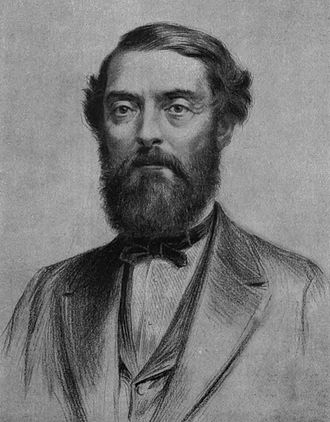This Week in History
August 23 - 29, 2015
Dispatch from the Committee of Correspondence,[1]
Edwin Drake Drills America's First Oil Well
(August 28, 1859)
By Pamela Lowry
 Edwin Laurentine Drake (1819-1880)
|
August 28, 1859--In Titusville, Pennsylvania today a former railroad conductor named Edwin Drake successfully drove a drill down through a pipe inserted in bedrock and brought in America's first oil well. Mr. Drake had overcome a number of daunting problems in his attempt to find a method of extracting the oil from the western Pennsylvania soil, where it is often found in creeks and salt wells. When he began last year, Mr. Drake employed men to dig with picks and shovels, but with no success. He then built a wooden derrick, using a $500 nautical engine for power to conduct drilling. As an assistant Mr. Drake hired a blacksmith named "Uncle Billy" Smith, who had had experience boring for salt. When sand and clay clogged the drill hole, Drake drove pipe down to bedrock in order to form a shaft for the drill. Today, Mr. Drake hit oil at 69 and a half feet down, and he and his assistant have been filling every barrel they can find.
The substance pumped out by the well is called "Seneca oil" and has been used by the Indians for centuries as a soothing rub for aching joints. But this medicine is also expected to replace whale oil in the country's lamps, and could be used as a substitute for animal fat in greasing axles and industrial machinery.
Originally written in 1992 for an EIR radio program, "And now, news from the American Republic"
Footnote
[1] The Committees of Correspondence, best known from Benjamin Franklin’s work, were the American colonies’ means for maintaining communication lines in the years before the Revolutionary War. In 1764, Boston formed the earliest Committee of Correspondence to encourage opposition to Britain’s stiffening of customs enforcement and prohibition of American paper money. The following year, New York formed a similar committee to keep the other colonies notified of its actions in resisting the Stamp Act. In 1773, the Virginia House of Burgesses proposed that each colonial legislature appoint a committee for intercolonial correspondence. The exchanges that followed built solidarity during the turbulent times and helped bring about the formation of the First Continental Congress in 1774. The Committees continued to function in the following years as a US Intelligence Service.
